
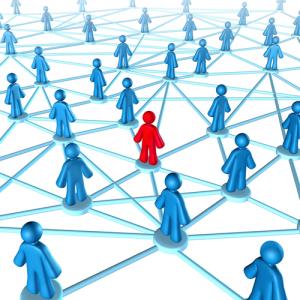
Network concept, Lightspring / Shutterstock.com
As we celebrate our nation’s independence this week, it’s good that we also celebrate our interdependence. Everything that we do, everything that we have, all that we are bears the fingerprints of countless others from around the world who have brought us to this moment and sustain us in it.
We tend to overlook this reality. We like to think of ourselves as independent. We dread those times when we feel dependent upon others — when we’re sick or struggling and need some sort of assistance. We’d rather do it ourselves and feel independent, even though we‘re really not.

Woman with cynical and happy emotion, Fotovika / Shutterstock.com
Skepticism is a good and healthy thing, I told every audience. Be skeptical and ask the hard, tough questions about our institutions — especially Washington and Wall Street. But cynicism is a spiritually dangerous thing because it is a buffer against personal commitment. Becoming so cynical that we don’t believe any change is possible allows us to step back, protect ourselves, grab for more security, and avoid taking any risks. If things can’t change, why should I be the one to show courage, take chances, and make strong personal commitments? I see people asking that question all the time.
But personal commitment is all that has ever changed the world, transformed human lives, and altered history. And if our cynicism prevents us from making courageous and committed personal choices and decisions, the hope for change will fade. Along the way, I got to thinking how the powers that be are the ones causing us to be so cynical. Maybe that is part of their plan — to actually cause and create more cynicism in order to prevent the kind of personal commitments that would threaten them with change.
And this is where faith comes in.

Young boy trying to save the world, alphaspirit / Shutterstock.com
After traveling the country this spring — while keeping an eye on Washington, D.C. — I am more convinced than ever that our personal decisions, choices, and commitments will change the world more than our politics. The message in the Epilogue to On God’s Side says this as well as I could do again. It’s short and very practical. Here it is:
The common good and the quality of our life together will finally be determined by the personal decisions we all make. The “commons” — those places where we come together as neighbors and citizens to share public space — will never be better than the quality of human life, or the human flourishing, in our own lives and households.
Here are ten personal decisions you can make to help foster the common good.
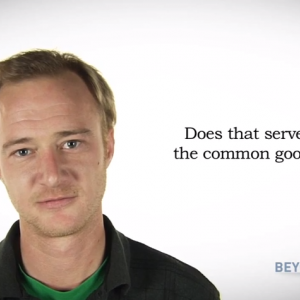
Screenshot from Beyond Bars' Common Good Video
The United States has the highest incarceration rate in the world — about 1.6 million people in 2010. Mass incarceration in our country is a problem, one that too often serves to line the pockets of for-profit prisons while tearing families apart and targeting people of color disproportionately.
Beyond Bars — a project to curb mass incarceration in the U.S. — produced the following video that puts faces to that problem. Watch the moving video below, and ask yourself the question: would putting them in prison serve the common good?
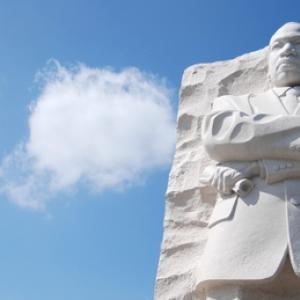
Martin Luther King, Jr., Memorial in Washington, D.C., Lissandra Melo / Shutterstock.com
Editor’s Note: Jim Wallis’ latest book On God’s Side: What Religion Forgets and Politics Hasn’t Learned About Serving the Common Good is sparking a national conversation of what it means to come together on issues that traditionally divide the nation. Bloggers Adam Ericksen and Tripp Hudgins are having that conversation here, on the God’s Politics blog. Follow along, and join the discussion in the comments section.
Benedict of Nursia is on my mind this morning as I ponder what it is that Jim Wallis is trying to accomplish with his new book, On God's Side. Adam Ericksen pondered the virtues of baseball, winning, and losing in his post from earlier this week. Adam questioned the metaphor. What do we do with our losers? How can we all win?
What would it mean if people of faith began transferring their human identities from class, racial, and national loyalties to a global identity in a new beloved community created by God?
~ Jim Wallis, On God's Side
Today I'm wondering about where Jim was when he started pulling all of this together. Jim shared that he went on retreat (a good practice, in my humble opinion) to gather his thoughts for this new book. He went to a monastery (also a good practice, in my humble opinion). He prayed the hours. He wandered the grounds. He spent some time in silence. He read the Narnia books and gave some serious thought of C.S. Lewis' Aslan. All of this led to a question, well, many questions, but this question I've pulled out is what caught my attention. What if, indeed, Jim. What if we were to do this thing ... the beloved community?
It is no surprise to me that this question would emerge while Jim was at a monastery. Of course it would. And that he riffs on Dr. Martin Luther King, Jr., in a way is also wonderfully telling. "Our goal is to create a beloved community and this will require a qualitative change in our souls as well as a quantitative change in our lives," said Dr. King. Our souls must change. So too must our lives. Dr. King said much about the beloved community. So too did Benedict of Nursia.
There's so much to say here. I'm a little stumped. The beloved community is the Church, but it is exemplified by the monastery where people relinquish their individual control of their worldly goods. Monastics take vows to pray and work together. There's a shared rhythm of life. There is a shared mission. It's a challenging and difficult life, and not all Christians are called to it. Obedience, stability, conversion of life. If we want to be the beloved community, then the we must avow ourselves to such a Rule. Indeed, we must give up our personal or private identities to the service of all.
But how do we do this as a culture, a global church?
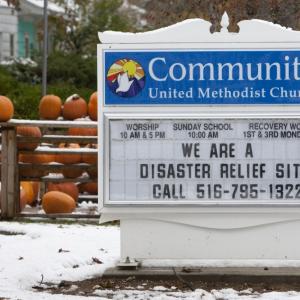
Church in Massapequa, N.Y. offers help. Photo courtesy of Mike DuBose.
This week marked six months since Superstorm Sandy left entire communities devastated, families homeless, and many with little hope. But in the midst of this natural disaster, many banded together. As is true with many of our nation's tragedies, recent and throughout our history, communities form and hope emerges amid struggle. Sandy taught us about resilience. It showed us what it truly means to reach out, serve, and love our neighbor.
One young filmmaker in New York, Farihah Zaman, caught that resilience and acts of service on video. Here, she shows us how tragedy can turn into a joint effort to acheive the common good.

Baseball runner's foot, Lauren Simmons / Shutterstock.com
Editor’s Note: Jim Wallis’ latest book On God’s Side: What Religion Forgets and Politics Hasn’t Learned About Serving the Common Good is sparking a national conversation of what it means to come together on issues that traditionally divide the nation. Bloggers Adam Ericksen and Tripp Hudgins are having that conversation here, on the God’s Politics blog. Follow along, and join the discussion in the comments section.
In his post “Lattes for the Common Good,” Tripp states that working for the common good starts in mundane places, like a coffee shop. These are the places where we practice neighborliness. Here’s Tripp’s brilliant point:
I wonder if one of the things that we can think about in terms of the common good is learning to practice neighborliness in the inconsequential moments so that when we face the bigger political difficulties of our shared life — when we start talking about the common good in the larger sense around some of the other issues like violence, and fear, and money — that maybe if we've already built up habits we can have these larger conversations with greater ease.
Jim Wallis says something very similar in his book On God’s Side. When it comes to the common good, Wallis states, “I have never seen the real changes we need come from inside politics. Instead, they come from outside social movements” (295).
According to Wallis, for those social movements to make any real change in our politics they must be based on the biblical command to “love your neighbor as yourself.” Indeed, On God’s Side begins with a reflection on the Golden Rule. And, as Tripp says, “learning to practice neighborliness” is learning to practice loving our neighbor as we love ourselves.
But there is a tension in Wallis’s book that, for me, is unresolved. That tension is clearly seen when Wallis talks about baseball.

Lattte, happydancing / Shutterstock.com
Editor’s Note: Jim Wallis’ latest book On God’s Side: What Religion Forgets and Politics Hasn’t Learned About Serving the Common Good is sparking a national conversation of what it means to come together on issues that traditionally divide the nation. Bloggers Adam Ericksen and Tripp Hudgins are having that conversation here, on the God’s Politics blog. Follow along, and join the discussion in the comments section.
"I'm hesitant to talk about the common good as if it's a discovery. This is not news. But maybe, maybe Jim's right in that we've forgotten how to practice it. So this is what I want to know, invoking the spirit of Fred Rogers as I do it: 'Who is your neighbor?' ... Because I wonder if one of the things that we can think about in terms of the common good is learning to practice neighborliness in the inconsequential moments so that when we face the bigger political difficulties of our shared life — when we start talking about the common good in the larger sense around some of the other issues like violence, and fear, and money — that maybe if we've already built up habits we can have these larger conversations with greater ease."

Still from video on Fundsazurza in the Dominican Republic
Stories are what change the world, more than just ideas. And that’s what I am seeing and hearing on the road — stories that will change people for the common good. Nobody outside of Washington trusts Washington because there are no more human stories — just money and the calculations of power.
But even Washington can be affected by the stories outside of Washington — take immigration reform for example, which will happen despite the political paralysis. People of faith are telling their stories of conversion to what their Bibles say about “the stranger.” They are telling stories of new relationships with their “undocumented” brothers and sisters. And their stories are changing Washington.
So rather than just offer you more “ideas” about the common good, we are going to offer you some stories about how ordinary people are creating it.
Some talented young filmmakers have created stories to inspire you. This first video tells in beautiful scenes, the story of how a group in the Dominican Republic is using a recycling program to fund senior services. It’s about community and about serving our neighbors. It is a real inspiration for working within our own spheres of influence for the good of all.
Watch. Listen. And then create your own story for the common good.
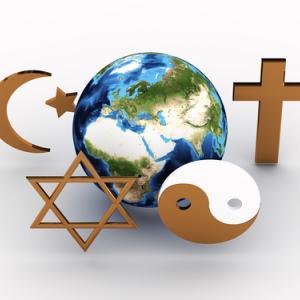
Interfaith religious symbols, Sana Design / Shutterstock.com
I agree with Rev. Wallis — focusing on the common good is a good step toward answering the question of how to be on God's side, and solving many of our nation's greatest points of division. In a country as diverse as ours, however, it can be challenging to know what the common good actually is. As individual participants in society, we all come to the table with different ideological structures for framing our understanding of what is commonly good. Those structures are often built around religion, philosophy, and our beliefs and understandings about existence, mortality, and the cosmos. The situation is exacerbated by the fact that we live in, arguably, the most religiously diverse nation of all time.
Yes, Jesus has called me to love my neighbor as myself, but what does that really mean when my neighbor is Mormon, Muslim, Jewish, Atheist, secular humanist, or Hindu?
Religion is often blamed for the world's greatest conflicts, and rightfully so. One doesn't have to look far to see conflict or violence that is linked to religious motivations or sentiments in some way (think the tragedy at the Boston Marathon or the Sikh man that was murdered shortly after 9/11 because he was wearing a turban). In a country that becomes more religiously diverse every day, it is easy to allow conflict to arise between different religious and non-religious groups. It is true, difference in religious and philosophical ideology can be a cause of great division. But what if I told you it doesn't have to be that way?
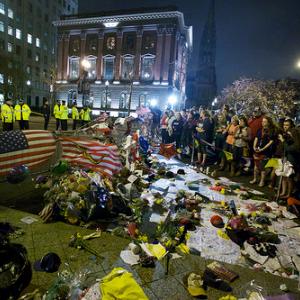
Boston bombing aftermath, Vjeran Pavic / Flickr.com
Editor’s Note: Jim Wallis’ latest book On God’s Side: What Religion Forgets and Politics Hasn’t Learned About Serving the Common Good is sparking a national conversation on what it means to come together on issues that traditionally divide the nation. Bloggers Adam Ericksen and Tripp Hudgins are having that conversation here, on the God’s Politics blog. Follow along, and join the discussion in the comments section.
What if we surprised our enemies?
I mean, really surprised them. What if we surprised them with something totally unexpected? When our personal, political, and national enemies strike us, they expect us to strike back. That’s been the human script since the foundations of human culture. We mimic violence blow for blow. Only each side wants to be the side who delivers the final blow.
What if we surprised our enemies and changed the script?
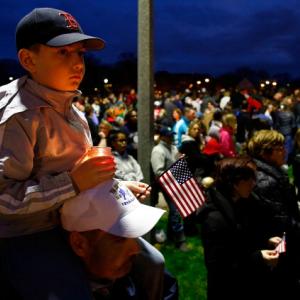
Young boy atop father's shoulders at vigil for Martin Richard, victim of Boston bombing. Jared Wickerham/Getty Images
I hear it over and over again both during my conversations on the road, and as I skim the headlines each day, that we are in a battle for the common good.
I learned about the Boston bombings as my plane landed in Portland, Ore., traveling for an 18-city book tour to spark a conversation on “the common good.” As I read and watched more about the tragedy, there unfolded such a stark and brutal contrast between the explicit intent to kill, hurt, and maim others, and the actions of those who rushed toward the blast, risking their own lives to help the wounded. One act of vicious violence was aimed to destroy the common good and create a society based on fear. The others displayed the highest commitment to redeem the common good and insist that we will not become a nation based on fear, but on mutual service and support.
When real or imagined grievances combine with rage, religious fundamentalism, political extremism, mental illness, or emotional instability, we lose the common good to dangerous violence, fear, and deep distrust in the social environment. But when grievances lead to civil discourse, moral engagement, and even love and forgiveness, different outcomes are possible.

Male, Female, and Transgender Gender Symbols. Photo courtesy Augusto Cabral/shutterstock.com
I am privileged to have a body that fits my gender, and for the majority of my life I was unaware of this ingrained and assumed personal and public privilege. As is the case with many in our world, during my adolescent years I never realized that “gender” and “sex” were two different aspects of my male identity, or in the words of Virginia Prince, I was unaware that “… gender is what’s above the neck and sex is what’s below the neck.” In light of these often ignored differences between gender and sex, I have come to recognize that many in our world do not experience full harmony between the two, and the result is a significantly misunderstood and strikingly marginalized transsexual and transgendered community.
While the differences between gender and sex are complicated, and the various distinctions between cultural and biological identity constructs are ongoing, The National Center for Transgender Equality estimates that 1 percent of all U.S. citizens are “trans.” However, as gender variance is rarely discussed in mainstream society, it would appear that far too many continue to make false generalizations based upon sensationalized media accounts of cross-dressing and transsexuality. As stated by Deborah Rudacille in The Riddle of Gender: Science, Activism, and Transgender Rights:
Gender variance still seems to be considered a more suitable topic for late-night talk show jokes than for journals of public health and public policy, even though a recent needs assessment survey in Washington, D.C., estimated that the median life expectancy of a transgendered person in the nation’s capitol is only thirty-seven years … Though many are far better off materially that the subjects of the Washington, D.C., study, transgendered and transsexual people of every social class and at every income level share many of the same vulnerabilities. Public prejudices make it difficult for visibly transgendered or transsexual people to gain an education, employment, housing, or health care, and acute gender dysphoria leaves people at high risk for drug abuse, depression, and suicide.
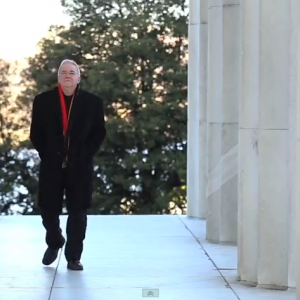
Jim Wallis at the Lincoln Memorial. Photo by Brandon Hook / Sojourners
I recently went back to the Lincoln Memorial to tell the story of how and why I wrote my new book, On God’s Side: What Religion Forgets and Politics Hasn’t Learned About Serving the Common Good. And I reflected on my favorite Lincoln quote, displayed on the book’s cover:
“My concern is not whether God is on our side: my greatest concern is to be on God’s side.”
I invite you to watch this short video, and to engage in the discussion as we move forward toward our common good. Blessings.
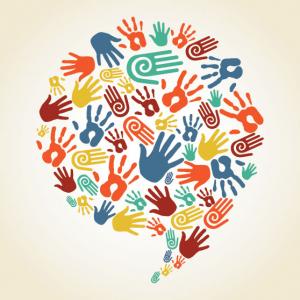
Social speech bubble, Cienpies Design / Shutterstock.com
Whenever I hear the term Common Good I think of Thomas Paine’s infamous pamphlet Common Sense,which challenged the British government and the royal monarchy, but did not challenge the institution of slavery. As an African-American woman I enter the Common Good conversation cautiously because I know that in our society we have a habit of taking what is good for Western hegemony and making it the standard for everyone else.
As we pursue the Common Good, let us remember what was once considered common and good during earlier points in American history: chattel slavery, indigenous genocide, and institutionalized sexism. To truly come to a Common Good, we need to honor a diversity of voices and challenge our assumptions about what is common and what is good. Our default is to take what is good for our culture, gender, or community and make it the common standard for all. I have experienced being invited into organizations that were aiming to do good in the world, but an expectation existed that I would be silent about my unique concerns as an African woman. I know that denying my reality can never be good for my spiritual, physical, or social well being.

Dome inside the U.S. Capitol Building, gary718 / Shutterstock.com
This week a large number of Americans are celebrating Holy Week, leading up to Easter Sunday. Churches will be packed with both the regulars as well as the once- or twice-a-year worshippers for the "Super Bowl of Sundays" to celebrate Christ’s victory over death and sin and his glorious resurrection.
In the midst of an exasperating and polarized political debate around the U.S. budget, our national and political leaders can learn valuable lessons from Holy Week. Whatever your faith background may be, we could all benefit from a greater commitment to the humility, shared sacrifice, and hope that Holy Week embodies. An extra dose of humility, sacrifice, and, ultimately, hope represent the balm that could bridge many of our ideological differences and resolve the current political impasse around the budget that has paralyzed our political system and divided the nation.
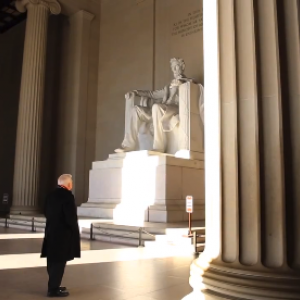
Jim Wallis at the Lincoln Memorial. Photo by Brandon Hook / Sojourners
A revealing thing happens when you remove yourself from the daily drum of politics and become a mere observer. I did just that last year, during some of the most divisive moments of the presidential election. Sitting back and watching the deluge of insults and accusations that feeds our political system, I witnessed the worst of us as a nation. And I came to the conclusion that it’s time to reframe our priorities.
When did we trade the idea of public servants for the false idols of power and privilege? When did we trade governing for campaigning? And when did we trade valuing those with the best ideas for rewarding those with the most money?
We’ve lost something as a nation when we can no longer look at one another as people, as Americans, and — for people of faith — as brothers and sisters. Differing opinions have become worst enemies and political parties have devolved into nothing more than petty games of blame.
During a three-month sabbatical, observing this mess we’ve gotten ourselves into, I prayed, meditated, read — and then I put pen to paper. The resulting book gets to the root of what I believe is the answer to our current state of unrest. It is not about right and left — or merely about partisan politics — but rather about the quality of our life together. It's about moving beyond the political ideologies that have both polarized and paralyzed us, by regaining a moral compass for both our public and personal lives — by reclaiming an ancient yet urgently timely idea: the common good.
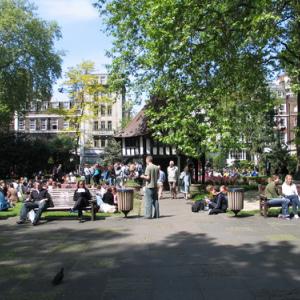
Soho Square, London, pablo / Shutterstock.com
The commons was the name for the public space shared by all in New England towns. It is the root of commonwealth, a nice term for an entire civic entity, like a state, in which every citizen is viewed as a stake-holder. Its values are the opposite of those decried in the lament “private wealth and public squalor.” The commons are the opposite of gated communities.
Today, there are two crises of the commons — one on the right and one on the left. One is indifference to the commons, even starving the commons. This means the demise of “social capital” (the sum total of all social networks and human investments in a community or polity) and civic values shared by all, and their surrender to utilitarian individualism and the dominance of the market. The other is the argument over what discourse style is appropriate to the commons — what language should be spoken and what subjects allowed in public life. Hint: lucid rationality is in, religion is out.

Trade As One provides a quarterly fair trade subscription for ethical consumption. Photo courtesy of Trade as One
At the Justice Conference last weekend I had the opportunity to sit down with Nathan George, founder of Trade As One, and ask him about buying fair trade and his company's awesome — and newly launched — fair trade subscription service. Here is the fruit of that conversation.
The interview was edited for length and content.
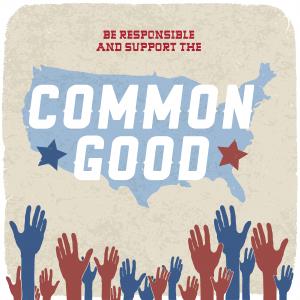
Let’s make the common good more common in our nation’s capital. pashabo / Shutterstock.com and Brandon Hook
Politics at its best serves the common good — far above any one interest or political party. And right now in Washington, we see that playing out as we continue to reach accord on immigration reform. But when it comes to our budget debate, partisan ideology and special interests are winning out over the common good.
The ever-looming “sequester” that was never supposed to happen goes into effect tomorrow. Billions of dollars will be cut from domestic and military spending without any plan or strategy; jobs will be lost and people will suffer. Public frustration is growing with our elected officials, while they continue to argue over the role of government instead of governing responsibly. The press discusses who wins and loses in the polls, but it is clear that it is the common good that is losing.
On the other hand, immigration reform is being discussed, at the same time with the same political players, in a very reasonable and hopeful way. On that important policy change, bipartisan work is going forward to shape legislation that could pass both houses of Congress.
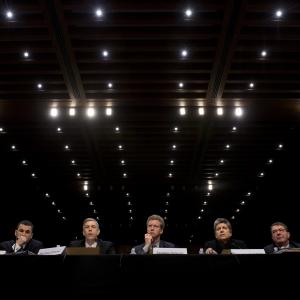
Senate Appropriations Committee hearing in Hart Building on the impacts of sequestration. Tom Williams/CQ Roll Call
The sequester battle is a good but tragic example of how the idea of the common good is failing in American politics. By contrast, the growing bipartisan support for comprehensive immigration reform is an alternative example of how a moral issue can rise about our ideologically driven politics.
The faith community has stepped into both issues with a call for political leaders to serve the common good. On immigration, political leaders are listening to the faith leaders; on the debates about our nation’s fiscal soul, political leaders need to listen better.
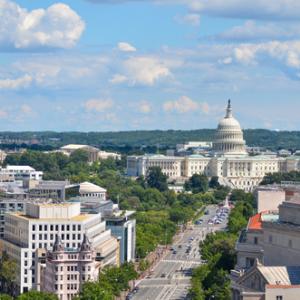
Aerial view of Pennsylvania Avenue, Orhan Cam / Shutterstock.com
I know I am not the only one who is sick and tired of Washington’s manufactured crises around budget and deficit debates. Brinksmanship has replaced statesmanship in trying to find a sound path to fiscal responsibility. It is time to make the right moral choices that will defend the most vulnerable and pursue an opportunity agenda to reduce the highest poverty rate in 50 years.
Ideological debates over the role of government are the real battle in the nation’s capital — more than the debt crisis. Political calculations about the next election are more important to many of our political leaders than the common good of the country.
It’s just time to move on from the partisan politics that has polarized and paralyzed us for so long — by committing ourselves to moral issues that could and should bring us together. The first will be comprehensive immigration reform, which will change the lives of 12 million people in this country, lift many out of poverty, and help the economy at the same time. This is a clear example of how the faith community has changed, and now come together to become a political game changer in Washington, D.C., at both ends of Pennsylvania Avenue on both sides of the aisle.
And it’s time to make another moral commitment in the midst of our growing economic recovery — to include poor families and change poverty into opportunity. Fighting poverty must not be a partisan issue. When we look at both the causes and the solutions, this battle should bring both liberals and conservatives together. Overcoming poverty, by creating opportunity, happens because of three very basic things that most of us can agree on: family, education, and work. All three are crucial and necessary in moving people out of poverty and into opportunity.
Let’s break it down.
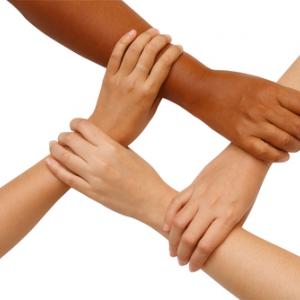
Interlocking hands, Praisaeng / Shutterstock.com
"The old avocations by which colored men obtained a livelihood are rapidly, unceasingly and inevitably passing into other hands; every hour sees the black man elbowed out of employment by some newly arrived emigrant, whose hunger and whose color are thought to give him a better title to the place."
-Frederick Douglass
“Learn Trades or Starve” (1853)
The Obama Administration and a bipartisan group in the Senate are making serious turns to tackle immigration reform. In addition to declaring that as citizens “our rights are wrapped up in the rights of others,” the president’s State of the Union address spoke of securing borders and decreasing the wait timeframe for the American residential legalizing process. Some 12 million women, men, and children across these United States await with bated breath to see what political deals will be made to construct either a pathway to citizenship or pave a road to deportation hell.
What is intriguing about the immigration conversation is that pundits tend to frame the argument in an "Us-versus-Them" fashion. Using rhetorical scare tactics, proponents for and against are not shy about disrobing a “more of them means less for us” stratagem. While much of this ploy has centered on how the massive number of “non-citizens” will subtract resources from persons of European descent, there is now a political stream that avers even sending “border breakers” to the back of the citizenship line will still reduce jobs among African-American low-wage earners. Words from Booker T. Washington, W.E.B DuBois, A. Philip Randolph, and the quote from Frederick Douglass, among many others, are now resurfacing as a clarion call for African-Americans to think long and hard about getting on the “brown” bandwagon. Yet, none of the language from the aforementioned historical figures specially addresses Latino immigration.

Common good concept, Gunnar Pippel / Shutterstock.com
The day after the 2012 election brought a great feeling of relief. Most of us, whether our candidates won or lost, were so weary of what elections have become that we were just glad the process was over. Many were disappointed that dysfunctional and bitterly partisan politics in Washington, D.C., had undermined their deep desires for “hope” and “change.” Politics has severely constrained those possibilities by focusing on blame instead of solutions, and winning instead of governing. And, as the most expensive election in American history just showed, the checks have replaced all the balances.
But the election results produced neither the salvation nor the damnation of the country, as some of the pundits on both sides seemed to suggest.
The results of the presidential election showed how dramatically a very diverse America is changing; people are longing for a vision of the common good that includes everyone. As one commentator put it “the demographic time bomb” has now been set off in American politics — and getting mostly white, male, and older voters is no longer enough to win elections, as the Romney campaign learned on Tuesday.